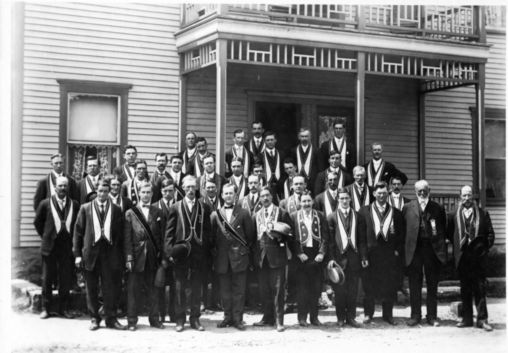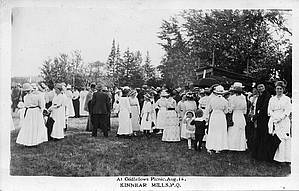

Share
Odd Fellowship in the Townships and Beyond
September 12th, 2016
The IOOF, the Independent Order of Odd Fellows, or simply the Odd Fellows. But what gives them the self-proclaimed description of being “odd”? The order of Odd Fellows has its earliest beginnings in 18th-century England as a fraternal order of individuals desiring to do charitable things independent of religious and political affiliations. The IOOF was officially founded with the Washington Lodge No. 1 in Baltimore, Maryland in 1819, which set in place a more formal method of operation and organization for the order. At the time of the Lodge’s founding, Baltimore was suffering from a yellow fever epidemic and, in response to this specific need, their first objectives were to “visit the sick, relieve the distress, bury the dead and educate the orphans.” As time progressed, however, their motto became that of friendship, love and trust, commonly represented by the triple link.
Although the Washington Lodge received its charter from their parent order in England, the Manchester Unity of Oddfellows, in 1826 Manchester Unity granted an independent charter to the Grand Lodge of the United States. The first lodges of Canada were established in Montreal in 1843 under the IOOF. The first decade of Odd Fellow lodges in Canada was a time of accomplishment and flourishing, as the number of chartered lodges spread rapidly throughout much of the country. This quick expansion with a peak of 28 lodges was followed by an equally rapid decline, however, so that there only eight active lodges remained by 1854, none of which were located in Quebec.
Nonetheless, the IOOF had continued to grow in the United States during this time while also becoming the first national fraternal order to include both men and women when the Rebekah Order was adopted in 1851, establishing the Rebekah Lodges of the IOOF. Despite challenges faced by the Canadian lodges mid-century, they continued to grow into the 20th century. Among the approximately 100 lodges country-wide in 1906, six lodges were in Quebec with three in the Eastern Townships (in Dunham, East Angus and Magog).
Into the 1910s, the IOOF in the Townships appears to have experienced new growth as a number of Lodges and Rebekah Lodges were founded around this time. As with other fraternal organizations, the Lodges of the IOOF were involved with a wide variety of charitable works but, more uniquely, they also aimed to provide care for the elderly and orphans through the establishment of homes dedicated to their care. Lodges in the Townships contributed to this objective with the establishment of the Edith Kathan Home I.O.O.F. for senior citizens in West Brome. As with many similar organizations, membership in the I.O.O.F. has declined into the 21st century, resulting in the closure of a number of lodges.
Despite these challenges, however, the remaining Odd Fellows and Rebekahs in the Townships continue to persevere in their fundraising to help local homes, hospitals, and schools, as well as humanitarian organizations.

Photo credit : P135/008 H.K. Warren Milne Collection
Magog Oddfellows, taken outside Henry Chamberlin's house on Pine Street, Magog, ca. 1910. Among those pictured: Tom Broadbent, Bill McKenna, Charlie Styan, Scotty MacDonald, Willi Brevoort, Harry Spinks, Foster Baker(?), Jim Conners, Norman Ratcliffe, George Cunningham, Fred Whittaker, Ernest Snape, Frank Williams(?), George Mallinson, Glen Hitchcock, Jimmy Mitchell, Francis Milne, Harry Spinks, Henry Chamberlin, Alf Levick, Dan Peters, Jack Sampson, and Alec Mitchell.
